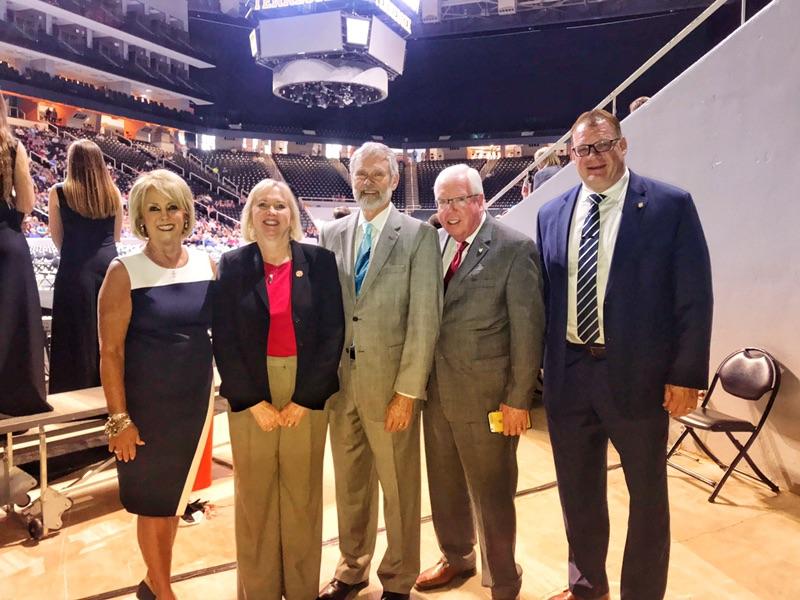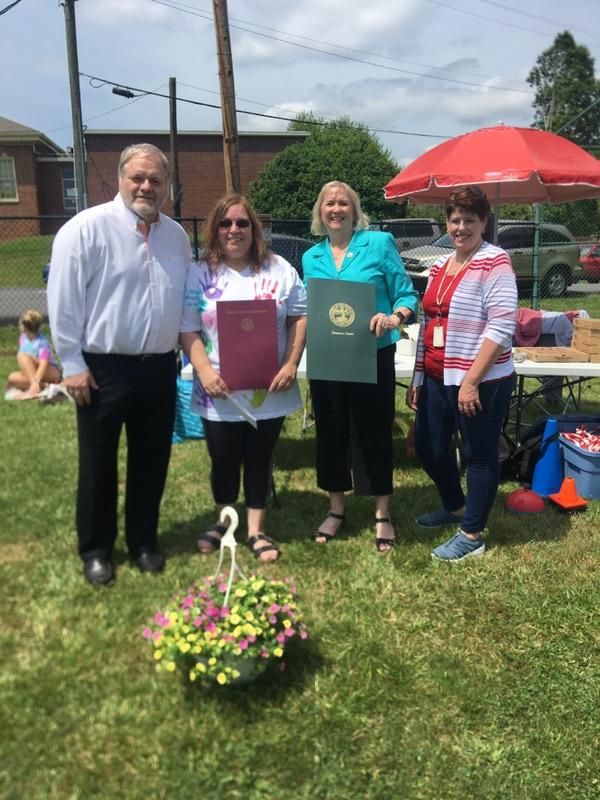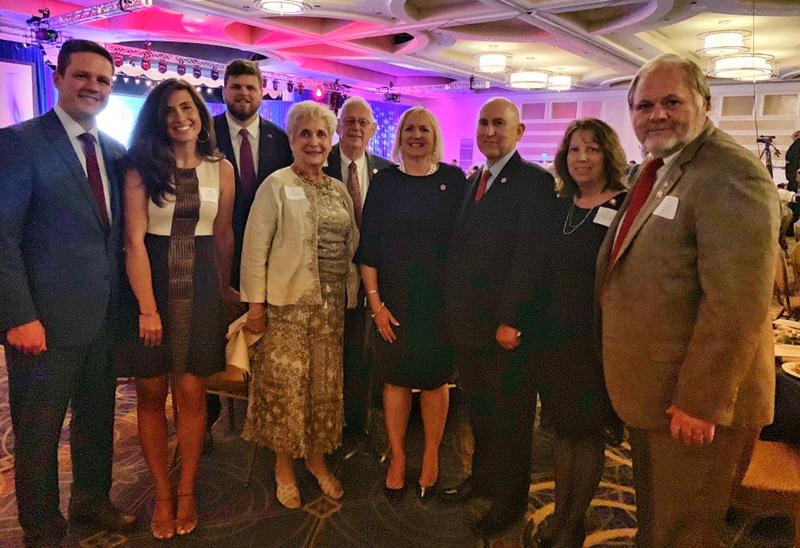
Key July 1, 2019 Enactments
Sexual Offenses / Human Trafficking
Statute of Limitations / Child Sex Abuse — The General Assembly continued to make progress in strengthening penalties against sexual offenders during the 2019 legislative session. This includes a major new law which removes the statute of limitations for felony sex crimes against children if the victim is under the age of 13 or ages 13 to 17 years old when the crime is reported before their 23rd birthday. If victims were 13 to 17 years old and did not report before their 23rd birthday, the statute of limitations is 25 years from their 18th birthday. After those 25 years, the case can proceed if there is corroborating evidence of the allegations or similar acts by the defendant.
The new statute also increases the time for civil claims involving child sexual abuse to be filed from 7 to 15 years after the victim turns 18 years old.
Some of the felony crimes involving minors covered by the bill include: trafficking for a commercial sex act, crimes involving rape, crimes involving sexually battery, patronizing or promoting prostitution, continuous sexual abuse of a child, crimes involving sexual exploitation, sexual battery, incest, indecent exposure, and unlawful photographing. I was a co-sponsor of this bill. Public Chapter 499.
Aggravated Rape of a Child / Life without Parole — A new law was approved during the 2019 session increasing penalties for persons convicted of aggravated rape of a child. It establishes that no sentence hearing shall take place and that all persons convicted of aggravated rape of a child will be sentenced to life in prison without the possibility of parole.
Prior to this legislation, the punishment for a conviction of this offence ranged from 34 to 60 years in prison with a fine of no more than $50,000. Aggravated rape of a child is a Class A felony and is defined as rape of a victim who is three years of age or less. Public Chapter 211
Domestic Violence
Leigh Ann’s Law / Domestic Violence — The General Assembly passed the Leigh Ann Act to help protect victims of domestic violence. The legislation is named for a Tennessee woman who was murdered 17 years ago in an act of domestic violence by her former boyfriend who violated a no contact order. It creates a Class A misdemeanor for a person who is arrested on domestic violence charges to knowingly violate a no contact order that is issued prior to the defendant’s release on bond. Public Chapter 393
Domestic Violence Proceedings / Coercion of Victims – The General Assembly approved legislation this year to strengthen penalties for offenders who try to coerce victims of domestic violence in judicial proceedings. I was the prime sponsor of this new law which creates a Class A misdemeanor for influencing a witness to give untruthful testimony or evade the process in a domestic violence case. This offense can only occur in a criminal case involving domestic assault.
Often, the greatest obstacle to address domestic violence is keeping the victim and key witnesses involved in judicial proceedings until the case is concluded. The reasons for the failure of victims or witnesses to cooperate are complicated and varied but often involve coercion or improper influence to testify falsely, withhold testimony or elude the legal process. Currently it is a Class D felony to coerce a domestic violence witness by threat, but there is a gap between a threat of violence and influencing a witness by less aggressive but equally damaging means. The new Class A misdemeanor gives law enforcement and prosecutors a tool to prevent calls from jail or contacts made after the release that instruct or encourage the victim to evade court or lie to authorities. Public Chapter 104
Child Abuse – Final approval was given to legislation which makes it a crime for a parent or legal guardian to withdraw or change a child’s school enrollment, with the intent to hinder a child abuse investigation. The legislation creates a Class A misdemeanor and Class E felony if a parent, guardian or other legal custodian hinders an ongoing child abuse or neglect investigation. A violation of the content outlined would be a Class A misdemeanor and a Class E felony if it involves taking the child out of the state. Public Chapter 398
Crime
Truth in Sentencing — A truth in sentencing law was approved this year, ensuring that Class A, B, or C felons, which are violent offenders, are required to serve the minimum sentence for their crimes before being eligible for reduction credits for good behavior. This action allows both crime victims and perpetrators to have an accurate timeframe for minimum sentencing. The new statute also presumes that Class E or D nonviolent felons will be released on parole when they reach their ‘red date’ (release eligibility date) unless good cause is shown for why the inmate should not be released.
Public Chapter 488
JuJuan Latham Act – A new law passed this year strengthens penalties against those convicted of harming a minor during a drive-by shooting. It establishes enhanced penalties when discharging a firearm from a vehicle results in harming a minor. Offenses include intentional/knowing aggravated assault, reckless aggravated assault, second degree murder, voluntary manslaughter, reckless homicide, and criminally negligent homicide.
The measure is named the JaJuan Latham Act for a 12-year-old, Knoxville boy who was killed in a drive-by shooting while in the back of his father’s parked car. JaJuan had just attended a “Stop the Violence” basketball game organized by former University of Tennessee basketball player Bobby Maze. The event was honoring the memory of JaJuan’s cousin, Zaevion Dobson, who was also killed in a drive-by shooting just months earlier while shielding several girls from gunfire. Public Chapter 485
Statute of Limitations – A new law removing the statute of limitations for second degree murder was approved during the 2019 legislative session. It extends the statute of limitations for prosecution of second degree murder from 15 years after the offense to any time after the offense is committed. The legislation comes from the recommendation of the 110th General Assembly’s Tennessee Advisory Commission on Intergovernmental Relations (TACIR) study and will bring Tennessee in line with criminal law regarding the statute of limitations from across the country.Public Chapter 410

I enjoyed joining Commissioner Penny Schwinn, Tennessee Department of Education, at her visit with the faculty and administration at the L&N Stem Academy
Health / Mental Health
Defibrillators / Schools – A new law enhancing the number of accessible AEDs and ensuring that the devices are available in all public schools will become effective July 1. It requires public middle and elementary schools to place an AED within their facilities so that the lifesaving equipment is in close proximity when needed.
The legislation complements the Tanner Lee Jameson Act passed in 2010 which required that schools place an AED in the gym, or if there is no gym, in a readily accessible location. The bill was named after the thirteen year-old Blount County teen who died on June 26, 2009 when he collapsed during his middle school basketball game. In 2016, the General Assembly expanded the act to ensure school personnel have training in how to use AEDs. It also required the instruction be included in the school’s curriculum for juniors and seniors in high school. In addition, last year lawmakers provided funding for defibrillators in certain schools which have not been able to afford them. Public Chapter 391
Healthcare Consumers / Truth in Advertising — Legislation was approved this year to address misleading and unclear “bad drug” and medical device compensation advertisements and the careless handling and selling a person’s private health information. The new law prohibits advertisements which falsely lead viewers to believe a drug or device is no longer FDA approved through means such as using the phrases “medical alert,” “recall,” or “public service announcement,” or by displaying a government agency logo. It also calls for the advertisements to be more transparent by revealing who is sponsoring it, as well as adding a disclosure directing patients to “not stop taking a prescribed medication without first consulting their doctor.”
In addition, the legislation makes it illegal for third parties to collect, sell, or transfer a person’s protected health information without their knowledge. Penalties for violation of this statute are placed under the Tennessee Consumer Protection Act, punishable as a misdemeanor charge with up to one year in prison and/or a $1,000 fine. Public Chapter 119
Suicide Prevention / College Students — Legislation aiming to prevent suicide among college students in Tennessee passed the General Assembly in 2019. Suicide is the second leading cause of death among college students in the state. The new law requires public institutions of higher education to develop and implement suicide prevention plans in consultation with campus and community mental health experts or the Tennessee Suicide Prevention Network (TSPN). The state institutions will then communicate the plans to students, faculty, and staff. TSPN is a grass-roots association which includes counselors, mental health professionals, physicians, clergy, journalists, social workers, and law enforcement personnel, as well as survivors of suicide attempts. The organization works to eliminate the stigma of suicide and educate communities about warning signs. Public Chapter 455
Elderly Victimization / Medical Information – Another new law set to become effective July aims to protect Tennessee’s elderly from being victimized financially by scammers. The legislation helps protect senior and vulnerable adults from being scammed by unscrupulous companies looking to steal their medical information and write a fraudulent prescription for medical devices, supplies or medicine. The new law creates a Class D felony for any person who knowingly uses a phone or an electronic device to obtain information from an elderly person regarding their medical history or health, and then sends unsolicited medical supplies or prescriptions to them in order to file a claim. Public Chapter 417
Education
GIVE ACT / Vocational Education — The General Assembly acted this year to establish the Governor’s Investment in Vocational Education (GIVE) Act to develop work-based learning and apprenticeship opportunities through regional partnerships. The purpose of the new law is to increase the number of young adults in Tennessee earning an industry certification and entering a career within one year of high school graduation. It provides funding for high school juniors and seniors to utilize four fully-funded dual enrollment credits for high-skill, high-demand, career-focused programs from community colleges and Tennessee Colleges of Applied Technology (TCAT).
Under the new statute, a student’s acceptance of a GIVE Dual Enrollment grant would not take away from his or her eligibility for the HOPE Scholarship or TN Promise. Funding for GIVE Dual Enrollment grants is through excess lottery funds after HOPE, Promise, and Reconnect are all fully funded.
Since 2005, Tennessee has provided lottery funds for higher education coursework while students are still in high school. The current dual enrollment program provides full funding for two college courses and a portion of a third. The GIVE Dual Enrollment Grant will provide additional money to fully fund the third and fourth courses for students dual-enrolled in a TCAT or Community College teaching a high-skill, high-demand trade, as determined by the Tennessee Student Assistance Corporation (TSAC) Board of Directors.
Last year over 28,000 students received a total of $21.5 million in lottery funding for dual enrollment. Public Chapter 203
Increasing Awareness / Work Readiness Programs — Legislation increasing awareness for post-secondary and work readiness programs offered to high school students by their Local Education Agencies (LEAs) became law in 2019. Offering opportunities for high school students to earn college credit or a professional certification can produce extremely valuable long-term benefits and helps the state meet its Drive to 55 goal to increase post-secondary graduation rates. The new act requires notification to students and their families of all early college and career opportunities offered by the school district. Programs include work-based learning, apprenticeships, dual enrollment programs, dual credit programs, and college credit-bearing courses. The legislation also calls for listing the opportunities on the school district’s website. Public Chapter 274
TNReady Tests — Final approval was given to legislation this session changing the way the TNReady test will be administered in the 2019-2020 and 2020-2021 academic school years. It requires that the TNReady test be administered in paper format for the 2019-2020 school year. As for the 2020-2021 academic year, the Local Education Agencies (LEAs) will be required to participate in an online verification test conducted by the Department of Education. The Commissioner of the Department of Education will then use the verification test results to determine which format to administer the TNReady test for that school year. Public Chapter 475

It was an honor to attend seven high school graduations this year and congratulate the new graduates
(Austin-East, Bearden, Carter, Gibbs, Halls, South-Doyle and West)
Tax Relief / Business
Tax Equity / Small Business – Legislation set for July 1 enactment provides tax cuts for small businesses which experienced inequities. One new law repeals the state’s amusement tax on gym memberships and fitness centers, leveling the playing field with their larger counterparts. Public Chapter 159
Courts / MISC. / Criminal Justice Reform
Relative Caregivers / Notice of Resources – During the 2019 session, lawmakers approved legislation to help relative caregivers receive information about resources and funding available to help care for a child or children under their guardianship. It directs the Department of Children’s Services (DCS) to distribute information on resources available to relative caregivers to the Administrative Office of the Courts (AOC), which will then distribute the information to each court within the state that issues orders regarding child custody or guardianship, and the courts are directed to notify the relative caregivers about available financial resources. Relative caregivers do not receive the same financial benefits that foster parents receive. However, often relative caregivers are grandparents or older relatives with a fixed income and can be burdened by the cost to unexpectedly care for children. In Tennessee, over 77,000 minor children are raised by relative caregivers over the age of 60. Public Chapter 130
Criminal Charges Expungement Fee – Another new criminal justice reform law eliminates the burdensome $180 expungement fee associated with clearing records of certain criminal charges. The legislation aims to help these individuals secure employment and stable housing instead of re-entering prison. Public Chapter 200
Emergency Responders
Firefighters Occupational Cancers — Several key bills were approved this year aiding emergency responders, including the Barry Brady Act which allows firefighters to be eligible to receive workers compensation benefits for certain cancers. The legislation is named for a retired captain of the Sparta Fire Department who passed away from cancer on April 4, 2019, at the age of 50, with over 31 years in fire service.
The act establishes a presumption that any conditions or impairments of full-time firefighters were caused by certain occupational cancers which occurred while on the job. Cancers covered are: non-Hodgkin’s lymphoma, colon cancer, skin cancer, and multiple myeloma.
Eligible firefighters must have been exposed during five or more consecutive years employed with a fire department and must have passed a pre-employment physical exam. An eligible firefighter may file a medical claim pertaining to any condition or impairment of the cancers listed in the bill for up to five years after the most recent date of exposure. Public Chapter 490
In-Service Training Compensation — Firefighters and law enforcement officers will benefit from legislation which raises the supplemental pay for the successful completion of 40 hours of annual in-service training from $600 to $800. The bill is effective July 1. Public Chapter 152
Roads / DUI
Handheld Phones / Driving — Road safety is the impetus behind legislation passed this year which prohibits a person from physically holding or supporting a cellphone while operating a motor vehicle unless the vehicle is lawfully stopped or parked. A person may still talk on the phone while driving but must do so using hands-free devices such as an earpiece, headphone device, wrist device, or connectivity to a vehicle.
Those drivers found in violation are subject to a Class C misdemeanor, punishable by fine only, not to exceed $50 for the first and second offense. The violation will result in a $100 fine for a person’s third offense or if the violation results in an accident, while the fine is $200 if it is in a work zone when workers are present or in a marked school zone when warning flashers are on.
A function or feature of the cellphone, such as GPS navigation, may be used if the device is mounted in a manner that does not hinder the view of the road and can be activated or deactivated with the motion or swipe of a finger.
A study conducted utilizing National Highway Traffic Administration data shows Tennessee was the worst state in the nation for cellphone distracted driving deaths with nearly five times the national average of 1.49 fatalities per 10 billion vehicle miles. The purpose of the legislation is to save lives by discouraging distracted driving. Public Chapter 412
Accident Reports / Public Records – I sponsored legislation protecting people’s private information after being involved in a motor vehicle accident has passed and becomes effective July 1. The new statute redacts personally identifying information from accident reports to prevent victims from being constantly and illegally solicited. The personally identifying information redacted includes a person’s address, telephone number, driver license number, and insurance information. Public Chapter 111
Sports Gaming
Tennessee Sports Gaming Act — Two key bills were approved during the 2019 legislative session regarding sports entertainment and gaming, with both becoming effective July 1. This includes a new law which legalizes, regulates and taxes online sports betting in Tennessee. In 2018, the United States Supreme Court repealed the Professional and Amateur Sports Protection Act through its ruling in Murphy v. NCAA. This repeal gave the states the authority to regulate sports betting. The new statute provides consumer protections for Tennesseans who bet on sports, creating the Lottery Corporation Gaming Advisory Council to oversee and promulgate rules and regulations in accordance with robust regulatory provisions. One of those provisions is that persons must be 21 years of age or older to participate in online sports betting. The Fiscal Review Committee estimates that online sports betting will amount to $50 million in revenue by the second year of enactment. Public Chapter 507
Veterans
Professional Out-of-State Licensure / U.S. Armed Forces Members and Spouse – The General Assembly approved legislation allowing a member of the U.S. Armed Forces or his/her spouse to practice their occupation for up to one year with an out-of-state medical license when stationed in Tennessee. For military personnel and their families who relocate to Tennessee, it can be a burden to obtain Tennessee licenses for medical professions when added to the challenges of relocating to another state. This new law seeks to take some of the burden away by giving these individuals one year to obtain a Tennessee license for the profession they are currently licensed to practice out-of-state. Under the new law, these armed forces members and their spouses are eligible to practice occupations regulated by the Department of Commerce and Insurance or the Department of Health, as long the license from their home state is current and they are in good standing with the state of their currently held license. Public Chapter 195
Other
Office of Faith-Based and Community Initiatives – A new law set to become effective July 1 establishes the Governor’s Office of Faith-Based and Community Initiatives. It facilitates collaboration between state government and faith-based and community organizations working to improve public safety, reduce addiction, strengthen families and communities, and overcome poverty in the state. The office will serve as a clearinghouse for organizations to help them work together to best serve Tennesseans in need and identify any available resources that might be available to assist them. The overall purpose of the new law is to maximize the effectiveness of government and private efforts to serve Tennesseans in need. Public Chapter 218
Elected Officials / Ineligibility for Holding Office – Final approval was given to legislation this year to help ensure that an elected official who is convicted of an infamous crime committed while in their official capacity cannot run for office again. The new statute closes a loophole in current law by prohibiting an elected public official that has accepted a plea agreement for an offense committed in the person’s official capacity or involving the duties of the person’s office from qualifying for, seeking, or holding public office or any political subdivision in this state at some point in the future after the plea agreement has been agreed to by all parties. Public Chapter 281

I appreciate the Downtown Sertoma Club invitating me to give a session recap.

It was a pleasure join Commissioner Carson Dailey and School Board member Kristi Kristy in honoring Gap Creek Elementary School Principal Lisa Light on her retirement

We also honored New Hopewell Elementary School Principal Pat Moore on her retirement

Senator Richard Briggs and I were joined by friends from Knoxville for the Tennessee Republican Party Statesmen’s Dinner

I was joined by members of the Senate and House Transportation Committees to tour the Volkswagen plant in Chattanooga
For information on State Senators including phone numbers and email addresses, click Tennessee State Senators.
For House members, click Tennessee House Members
For all other information on the General Assembly including legislation, schedules and videos, click Tennessee General Assembly
If you would like for me to speak to your organization or to meet, please contact my office to schedule.
As always thank you for continued support!
Sincerely,
Becky Massey
District 6 Senator
615-741-1648.
